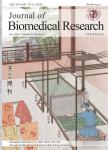Bladder cancer epidemiology and genetic susceptibility
Bladder cancer epidemiology and genetic susceptibility作者机构:Department of Environmental GenomicsJiangsu Key Laboratory of Cancer BiomarkersPrevention and TreatmentCancer CenterNanjing Medical University Department of Genetic Toxicologythe Key Laboratory of Modern Toxicology of Ministry of EducationSchool of Public HealthNanjing Medical University
出 版 物:《The Journal of Biomedical Research》 (生物医学研究杂志(英文版))
年 卷 期:2013年第27卷第3期
页 面:170-178页
学科分类:0710[理学-生物学] 1002[医学-临床医学] 100214[医学-肿瘤学] 10[医学]
基 金:supported by National Natural Science Foundation of China (No.81230068, and No.81102089) the Natural Science Foundation of Jiangsu Province (No.BK2011773) the Key Program for Basic Research of Jiangsu Provincial Department of Education (No.12KJA330002,and No.11KJB330002) Jiangsu Provincial Graduates Innovative Project (CXZZ12_0594) the Qing Lan Project of Jiangsu Provincial Department of Education the Priority Academic Program Development of Jiangsu Higher Education Institution (Public Health and Preventive Medicine)
主 题:bladder cancer molecular epidemiology risk factors genetic susceptibility
摘 要:Bladder cancer is the most common malignancy of the urinary system. The incidence of bladder cancer of men is higher than that of women (approximately 4:1). Here, we summarize the bladder cancer-related risk factors, in- cluding environmental and genetic factors. In recent years, although the mortality rate induced by bladder cancer has been stable or decreased gradually, the public health effect may be pronounced. The well-established risk fac- tors for bladder cancer are cigarette smoking and occupational exposure. Genetic factors also play important roles in the susceptibility to bladder cancer. A recent study demonstrated that hereditary non-polyposis colorectal cancer is associated with increased risk of bladder cancer. Since 2008, genome-wide association study (GWAS) has been used to identify the susceptibility loci for bladder cancer. Further gene-gene or gene-environment interaction stud- ies need to be conducted to provide more information for the etiology of bladder cancer.



